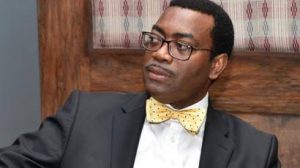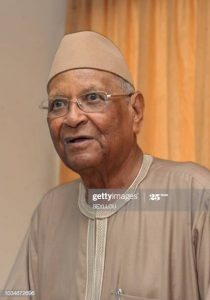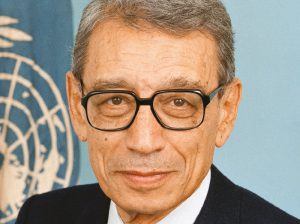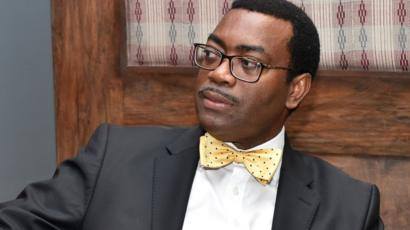 by Alagi Yorro Jallow.
by Alagi Yorro Jallow.
Fatoumatta: African nations are resisting the United States plan to remove Nigerian born Akinwunmi Adesina, the current President of the African Development Bank (AfDB), and replace it with their candidate. This is what the current brouhaha is about. Moreover, it is not unique to Africa.
History is repeating itself. Those rationales echo arguments made by the administration of President Ronald Reagan in December 1983, when the U.S. previously announced a decision to pull out of UNESCO: The case of Boutros Boutros-Ghali, an urbane Egyptian diplomat whose service as United Nations secretary-general during the early 1990s coincided with genocides from Rwanda to the Balkans as well as political frictions that caused the Clinton administration to block him from a second term.
Fatoumatta: African Union and African leaders should back and support the African born President Adenisa as head of the continental organization also prioritize building shared prosperity to assist new generations in having a viable and productive future. The African continent now boasts some of the fastest-growing economies in the world, which have lifted millions out of poverty and into the global marketplace. Sub-Saharan Africa represents one of the most significant opportunities for new markets for Europe and American goods and investment. Moreover, as African peoples demand greater accountability and transparency from our leaders, the United States must stand ready to put our values into action, to promote empowerment alongside economic engagement.

Latin American governments are currently resisting the United States takeover plan of The Inter-American Development Bank(IDB), their most crucial development bank when the new President is chosen in September. The Latin Americans have vowed to unite behind a well-qualified, Latin American candidate with the experience and the stature to lead the IDB at a critical time. Multilateralism matters.
Fatoumatta: This is the U.S. playbook. First, gain majority shareholding in an institution, then impose own candidates on the institution. As long as they control the major financial institutions, they can dictate the pace of development. It is their strategy to preserve U.S. dominance. One would expect the African Union and African
Heads of government to muster all diplomatic support. If Adesina is removed and prevented from a second term, it would be a significant setback for regional development. He has done very well, and the three global rating agencies just confirmed by an outstanding prestigious AAA award to the African Development Bank (AfDB). They also acknowledged his adroit management of the institution. Significantly, no CEO has ever asked for a share capital increase in his first term. Akinwunmi Adesina did this, and it was very successful, increasing capitalization from less than $100m the o nearly $300milion.

Fatoumatta: The words and deeds as well the conspiracy of removing Director-General of UNESCO in an interview with global media in January. 17, 1985 The United States and European leaders conspired to removed Senegalese born Amadou Mahtar M’Bow, head of the United Nations Educational, Scientific, and Cultural Organization and in many interviews, Mr. M’bow questioned U.S. Motives. M’Bow said the United States’ decision to leave Unesco was based solely on political motives and had nothing to do with accusations by the United States and other lousy management governments. He asserted that neither the United States Government nor Congress had ever accused him of running the secretariat poorly. In the interview, Mr. M’Bow denied United States assertions that 70 percent of Unesco’s total annual budget of $188 million is spent on administrative expenses. However, he did not provide an alternative figure.
Britain has also said it will leave Unesco unless it agrees to end politically disputed activities and improve management standards. West Germany, the Netherlands, Belgium, and Denmark have also sent official letters to Mr. M’Bow warning in vaguer terms that they may reconsider membership if Unesco does not change its ways. Today, several Western diplomats said that they believed Mr. M’Bow had further weakened his position inside the organization by accepting the gift from Libya’s leader and publicly insulting Mrs. Gerard.
Fatoumatta: For some time, many Western governments, critical of Unesco’s performance, have been saying privately that effective changes may be impossible. At the same time, Mr. M’Bow remains as director-general. However, none of them know how to remove him when he continues to enjoy the support of third world members and the Soviet bloc, which make up a majority of Unesco’s membership. French Role Sought
Fatoumatta: Many Western diplomats believe that France will have to play a vital role in any successful attempt to dislodge Mr. M’Bow. It is Unesco’s host country and because of its close ties with his native Senegal and other French-speaking African countries that support him.
Fatoumatta: President Leopold Senghor confirmed that he was in close touch with Mr. M’Bow and with the French Government about the Unesco crisis, but he denied that he was trying to persuade Mr. M’Bow to step down.
Fatoumatta: Adesina is the President of the African Development Bank. He previously served as Nigeria’s Minister of Agriculture and Rural Development. Until he was appointed Minister in 2010, he was Vice President of Policy and Partnerships for the Alliance for a Green Revolution in Africa (AGRA). Africans must continue to rally behind Adesina. The African Union and heads of the African government must also use all diplomatic opportunities to rally support for Adesina.

